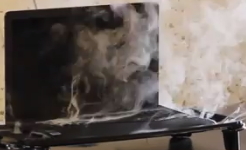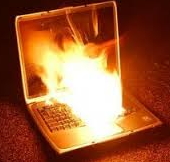 Tech
Tech
 Computing
Computing
 Lithium Batteries in Laptops Explode
Lithium Batteries in Laptops Explode
Home
 Tech
Tech
 Computing
Computing
 Lithium Batteries in Laptops Explode Lithium Batteries in Laptops Explode
|
 
Stories of exploding lithium ion (LiIon) batteries in laptops appeared around 2006.
In 2006 the U.S. Consumer Product Safety Commission reported only 43 laptop fires in the United States since 2001, or about 10 every year. When overheated batteries forced a 787 to make an emergency landing in 2013, people grew really concerned. There are about 130,000,000 laptops in the US. There are about 10 battery fires/explosions per year. Your chance of a problem is 1:13 MillionK.M. Abraham, one of the pioneers of the Li-ion battery and a professor at Northeastern University, says "Lithium-ion batteries have a failure rate that’s less than one in a million.” Source: Why Lithium-Ion Batteries Still Explode - Consumer Reports 2016
"You're far more likely to be struck by lightning (1 in 1,042,000) than ever see a battery flame up (1 in 10 million is the number experts tend to quote)." What causes it? There are numerous conditions where these fires can occur in real life. Faulty battery packs (driving the recalls), faulty protection circuits inside the PC, exposure to excessive heat, and blunt force are some of the major ways that this could happen to you. If the battery gets hot through use or recharging, little pieces of lithium metal (remnants of manufacturing) can move around in the liquid medium in a pressurized container, much like grains of rice in a pot of water. If a piece of metal gets too close to the separator between the anode and cathode, it can puncture the separator and cause a short circuit. There are a few possible scenarios for what can go wrong in the case of a short circuit:
There is certainly the specific case that started all this with Dell and I think what's out there is probably the very likely case is what Dell is saying is that in the Sony battery manufacturing process, some contaminates were introduced into the cells of the battery that allowed them to short out and overheat.
In June 2013 Best Buy recalled ATG Replacement Batteries for the MacBook Pro.
What to do: If your laptop gets exceedingly hot while charging or if it starts to smoke, unplug it and move it to a safe place for 15 minutes.
If it actually catches on fire, it is an electrical and metal (lithium burns), so you need a Class D fire extinguisher.
Class D (dry powder [Different than dry chemical]) extinguishers are expensive (>$400).
Links: |